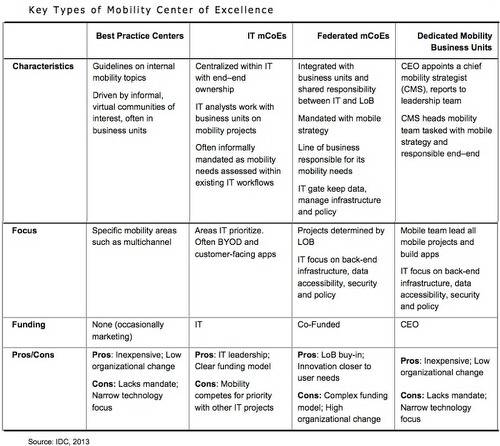
Many of the world’s biggest companies have only a couple of people in their entire IT department dedicated to mobile. This skeleton crew is responsible for building and maintainin the company’s mobile apps, devising strategies and solutions, handling employee issues around Bring Your Own Device (BYOD) policies and distributing software (apps) that coworkers need to do their jobs.
As you might imagine, these people are often woefully overworked, not equipped to handle the stacks of problems they face. They are in this situation because the geniuses in the executive suite believe that the company needs to “do mobile” – but because they don’t really understand the value, they’re unwilling to invest more than the absolute minimum amount of resources.
This scenario is a reality in many non-tech, Fortune 500 types of companies. They know they have to go mobile but have no idea what that really mean.
Research firm IDC has a better idea than the classic “band-aid on a shotgun wound” approach to new IT solutions for large enterprises: Mobile Centers of Excellence.
What Is A Mobile Center Of Excellence?
According to the IDC whitepaper, sponsored by Netbiscuits, A Mobile Center of Excellence (mCoE) offers a framework for enterprises to organize, manage and distribute their mobile enterprise solutions and initiatives. They can help develop and distribute internal mobile apps – need a CRM app or something to help the accounting department? Ask the mCoE – as well as external apps for customers and clients. An mCoE would help the IT department with security and BYOD issues, help implement infrastructure and cloud solutions for apps and generally serve as the nerve center for everything mobile in the enterprise.
IDC thinks enterprises could deploy four different kinds of mCoE:
- Best Practice Centers.
- IT-Focused.
- Federated (integrated with business units and IT).
- Dedicated Mobility Business Units.
The chart below outlines the characteristics of each type:

What’s The Real Value Of An mCoE?
It is very easy for a research and consulting firm to write a white paper claiming, “Hey, you should have a Mobile Center of Excellence.” Most likely, if you call IDC for consulting help on how to set up an mCoE, it would be happy to charge you hefty fees for its advice. Everybody is selling something, and it shouldn’t be a surprise that the mCoE whitepaper was sponsored by a mobile platform company.
The name itself is a red flag. Imagine a new IT buyer coming to a new company, turning to the person next to him and asking, “Where is the Mobility Center of Excellence?” He’d get laughed out of the room.

Really though, what the mCoE idea boils down to is that every big company needs a group of knowledgeable people that have the requisite skills and resources to handle mobile solutions quickly and efficiently. These people need to have power to make decisions, well-defined jobs that give them autonomy they need get things done. Enabling a group within your IT infrastructure to handle everything mobile problems could actually create competitive advantage for many companies.
Whether you call it a Mobile Center of Excellence or just create a de facto sub-group within your organization that takes the lead in mobile practices isn’t the point. The point is that enterprises can better manage their mobile priorities by assigning the task to a particular unit empowered to drive solutions for the entire company.
Images courtesy of Shutterstock.

















